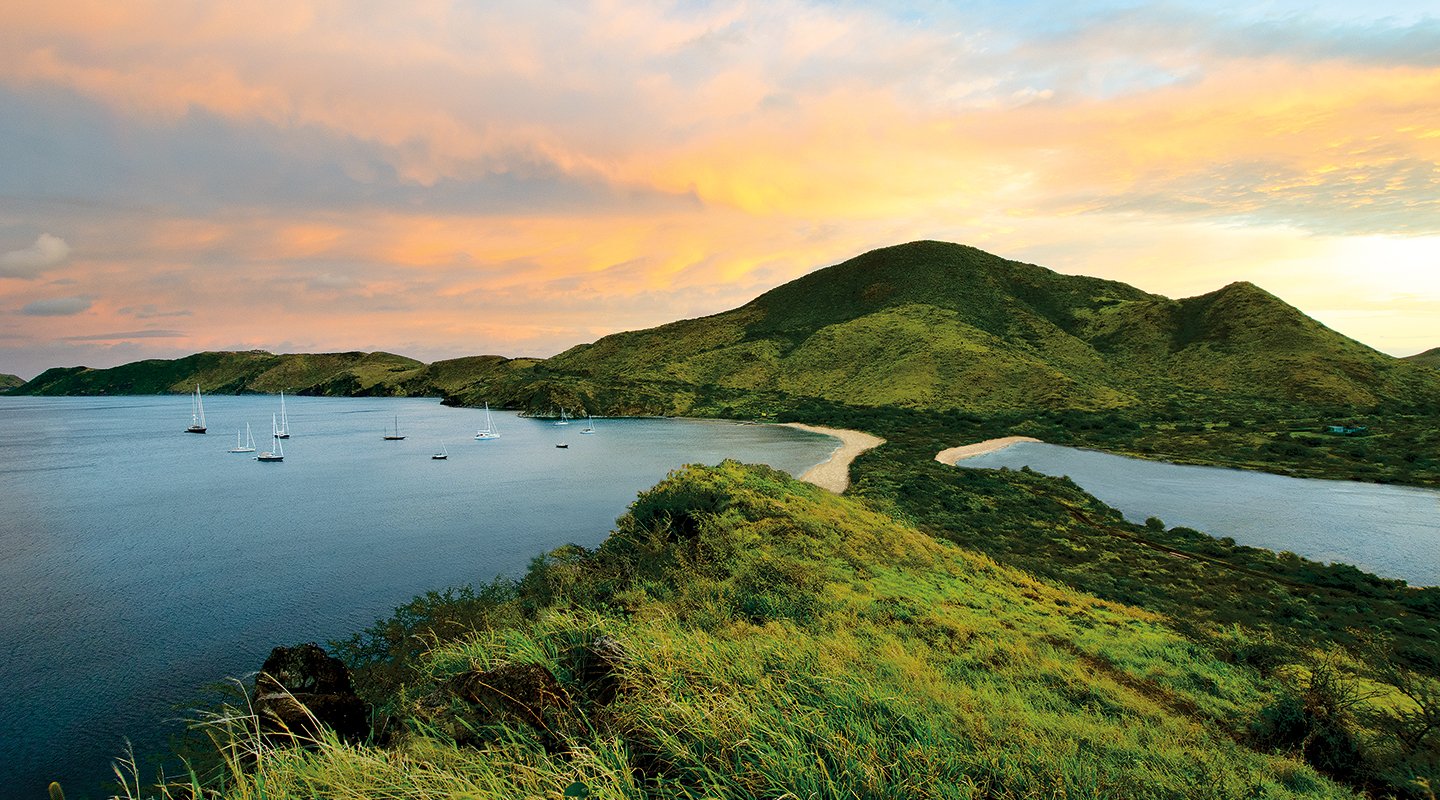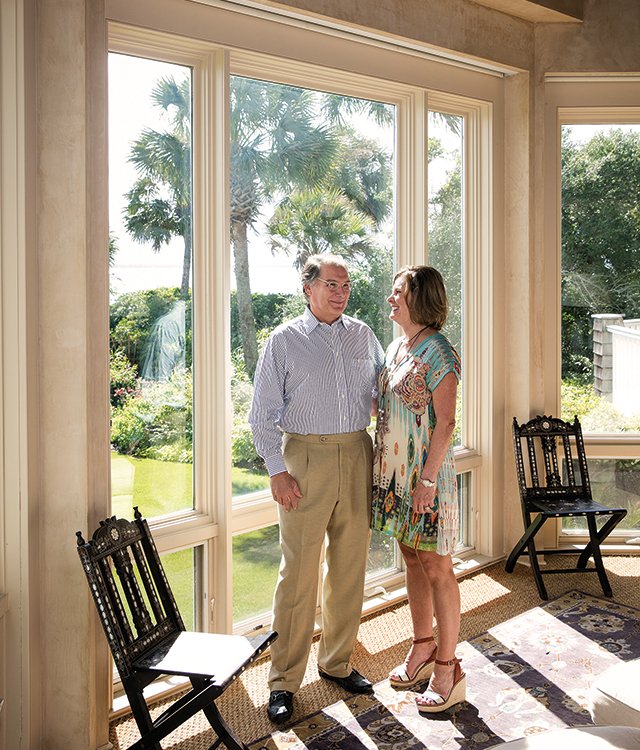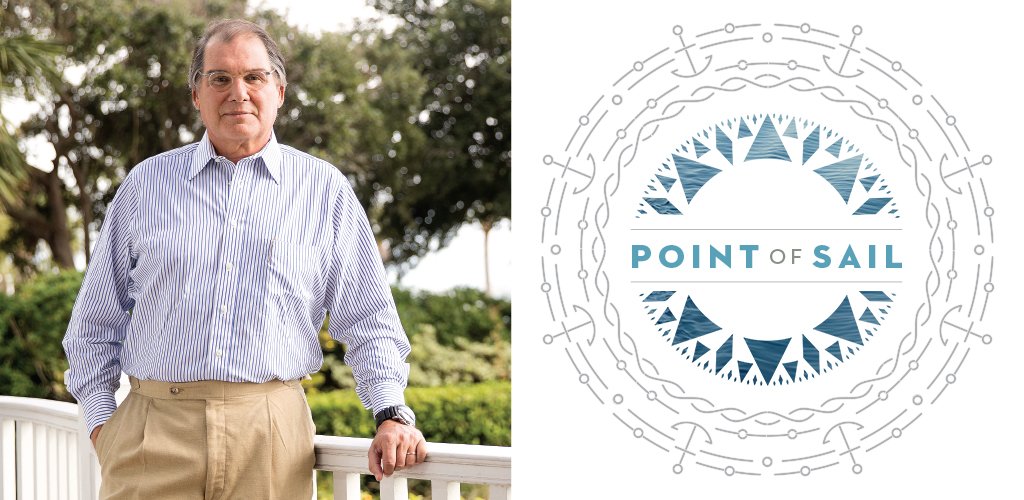There’s a hill on Christophe Harbour, a resort development on the southeastern end of the island of St. Kitts, where one can see the Atlantic Ocean and the nearby island of Nevis on one side and a great lagoon that opens out to the Caribbean Sea on the other. The view is all the more impressive knowing that the harbor, which also has a sophisticated yacht marina, was nothing but swampland less than 10 years ago. That’s when South Carolina developer Charles Pinckney “Buddy” Darby III first stood on that hill and, instead of 2,500 acres of salt marshes and brambles, saw a contiguous luxury marina and golf enclave.
“You had to use a little bit of imagination,” says Darby. “When I looked at the project, I saw the marina as the heartbeat.” He would hardly be the first real estate developer to have a vision, but creating a deep-water marina out of the muck and then marketing it to billionaires was unexpected on an island lacking even mainstream tourism. Christophe Harbour centers around a 250-berth marina—with 50 berths reserved for yachts measuring up to 250 feet in length and selling for $1.8 million and more. The marina has its own customs house and retail village to be completed in spring 2017. And the $175 million development will feature the first Park Hyatt hotel in the Caribbean, also opening in early 2017, in addition to luxury home communities, a beach club and restaurants.

“A master-planned community in the Caribbean had to start with the energy of the boats. You can then build a concentric circle of retail, hotels near the marina and residences,” says Darby. “The marina is an industry unto itself. There are hotels everywhere but very few places that have a marina like this.”
It was a prescient move. The yacht industry is on an upswing. In the first half of 2016 alone, 153 superyachts—leisure vessels measuring more than 98 feet long—were sold, according to data from yacht brokerage Camper & Nicholsons. That’s more than $1.5 billion in sales, a 15 percent increase over the same period last year. Some of those could find their way to Christophe Harbour, where half the existing berths have already sold. The attraction of a superyacht marina has also propelled the construction of 27 luxury homes and the sale of more than 134 properties, totaling in excess of $150 million. “This is a pretty exciting year ahead,” says Darby.
Others had come before Darby with development ideas for this part of the island. Both locals and foreigners had invested in the area with plans to build homes, but no real efforts were made until 2005, when Auberge Resorts Collection inked a deal with the Kittitian government to develop a stretch of land first called Whispering Head Resort, later renamed Christophe Harbour. In addition to what was marketed as the first Auberge hotel in the Caribbean, its plans included a Mandarin Oriental, two other hotels and 750 residences. But expertise was needed for that level of development, and that’s how Darby became involved.

The 60-year-old Charleston, S.C., native, who has sailed since he was 14 and owns a 154-foot yacht, already had nearly 30 years’ experience developing luxury island properties—a skill that ran in his family. Darby’s grandfather J. C. Long was once Charleston’s largest property owner and developed the Isle of Palms north of the city. Darby became involved with the family business shortly after college and followed in Long’s footsteps in 1988 with a breakthrough play for Kiawah Island. At the time, the 10,000-acre island south of Charleston was owned by a troubled Kuwaiti investment firm that had built a hotel and some residential complexes but wanted to divest the entire development. Darby quickly rounded up a group of investors—mostly family members—and, following 30 hours of negotiations, purchased the island for $105 million. Within three years, thanks to strategic development deals that Darby negotiated with the state of South Carolina, Kiawah had championship golf courses and hosted the Ryder Cup. Over the next 20 years of continuous development, his company sold more than $1 billion in land. Today, in addition to eco-friendly multimillion-dollar homes, Kiawah has a highly rated luxury hotel, several private clubs, a marina and has been the site of various PGA tournaments. Darby also helped develop the Lodge at Doonbeg, a luxury golf destination in Ireland, which was purchased by Donald Trump in 2014.
“I had assembled a great development team, and we had basically finished developing Kiawah and Doonbeg, so I was looking at either doing another project or letting people go,” Darby recalls. Christophe Harbour “was something I could apply our expertise to. It was a place where we could control the experience, from golf and hotel to security and landscaping, just like we have done in our other projects.” Auberge Resorts pulled out of the venture in 2008 during the recession, leaving Darby and his team to wholly oversee the project.

St. Kitts lies in the Leeward Islands, a cluster of islands in the eastern Caribbean that have been a favorite of affluent yachters for many years, not only because of their pristine beaches but also because their natural inaccessibility gives them a unique sense of privacy. Consistently strong winds and currents make it challenging for small leisure vessels to navigate comfortably, which is why the region has a high concentration of superyachts. “The trade winds in that area blow from east to west and never stop,” says David Steehler, captain of the 127-foot motor yacht Bella Una, owned by Sonoma winemakers Joe Anderson and Mary Dewane of Benovia Winery. “Large boats do better than small ones.”
Destinations such as St. Barths, St. Maarten and Anguilla flourished with luxury hospitality offerings because of this well-heeled sailing traffic. But despite its proximity to those yachting meccas, St. Kitts was an outlier. Scarred by numerous foreign-led hotel projects that never materialized, the island’s government had been slow to embrace tourism and create a service industry; its economy depended almost solely on sugarcane production, which was exhausted in 2005, and the only luxury hotel in the country was the aging Four Seasons on Nevis. But Darby convinced the Kittitian government that developing a superyacht marina would allow it to compete with neighboring ports of call. “I brought them up to Charleston and showed them how we would help change them from an agricultural economy into a service economy that performs at a high level,” he says.
“Kittitians are very sophisticated people—they travel a lot—but I don’t think they had seen anything as seamless as Kiawah before.”
Darby also wanted to introduce a marina product that didn’t exist in the Caribbean or almost anywhere else: freehold berths, which are deeded, inheritable and treated just like real estate. For yacht owners, who typically must lease berths for a fixed number of years, ownership offers greater value by reducing annual costs and providing real property with a high probability of appreciation. To create the deep-water marina, Darby opened up the great swamp at the center of Christophe Harbour to the ocean. But because the harbor previously was a marsh, the land now underwater still qualifies as real estate. “You literally get a plot of your slip just like you’d get a plot of land,” he says. And because St. Kitts has had a citizenship-by-investment program for foreign buyers since 1984, purchasing a berth qualifies buyers for a Kittitian passport. This option has been particularly attractive to millionaires looking to hedge their bets against political uncertainty in places like Russia, China—and the U.S. “When Obama came in, we had five or six sales just related to his election,” Darby remembers. “People wanted a passport in case they got taxed at a higher rate.”

The resort has not been without its critics. Former St. Kitts government minister G. A. Dwyer Astaphan opposed Christophe Harbour’s close partnership with the country’s government, which, he said in the West Indies News Network in September, gave Darby “a package of concessions and powers tantamount to creating a separate principality.” These include selling duty-free fuel, tax concessions on various goods and having an on-site customs-clearance point—all of which make the marina more enticing to visitors. Darby can even acquire a casino license. Dwyer Astaphan has also criticized the sluggishness of the project. After 10 years, home sites remain largely unbuilt, with just under 30 completed homes. And even David Steehler of the Bella Una expresses doubts: “St. Maarten is home to most yacht captains. It’s our hub,” he says. “To get captains away from the comfort level of St. Maarten, that’s going to take a lot. But if Christophe Harbour is done well, people might go ahead and jump because it’s not that far away.”
Darby concedes there was a long development slowdown during the recession, but that is changing. “We don’t have a permanent resident yet,” Darby says, “but we have a lot of people spending a lot of time down there.” Tourism figures back up his claim. According to Kittitian government data, almost 200 yachts visited the island this past winter, and 87 percent were classified as superyachts. “The number of superyachts spending time here has continued to grow, with almost half of them stopping over at our marina,” says Aeneas Hollins, director of yachting at Christophe Harbour. The Park Hyatt resort is already accepting reservations for its March 2017 opening. And the momentum extends across the narrows to Nevis, where Bill Gates recently purchased the Four Seasons Resort with plans for badly needed improvements that will attract more yacht tourism to the Christophe Harbour marina.
Christophe Harbour is still a long way from complete, but Darby is betting he can pull off another successful large-scale resort—and he’s counting on the growing yachting community to do so. “Everybody does the St. Maarten–St. Barths–Anguilla loop,” Darby says, referring to the popular island-hopping route for yachters. “We’re part of that loop now.”






